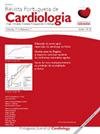Mesenchymal stem cells may alleviate angiotensin II-induced myocardial fibrosis and hypertrophy by upregulating SFRS3 expression
IF 1.6
4区 医学
Q3 CARDIAC & CARDIOVASCULAR SYSTEMS
引用次数: 0
Abstract
Introduction and objectives
The development of cardiac fibrosis (CF) and hypertrophy (CH) can lead to heart failure. Mesenchymal stem cells (MSCs) have shown promise in treating cardiac diseases. However, the relationship between MSCs and splicing factor arginine/serine rich-3 (SFRS3) remains unclear. In this study, our objectives are to investigate the effect of MSCs on SFRS3 expression, and their impact on CF and CH. Additionally, we aim to explore the function of the overexpression of SFRS3 in angiotensin II (Ang II)-treated cardiac fibroblasts (CFBs) and cardiac myocytes (CMCs).
Methods
Rat cardiac fibroblasts (rCFBs) or rat cardiac myocytes (rCMCs) were co-cultured with rat MSCs (rMSCs). The function of SFRS3 in Ang II-induced rCFBs and rCMCs was studied by overexpressing SFRS3 in these cells, both with and without the presence of rMSCs. We assessed the expression of SFRS3 and evaluated the cell cycle, proliferation and apoptosis of rCFBs and rCMCs. We also measured the levels of interleukin (IL)-β, IL-6 and tumor necrosis factor (TNF)-α and assessed the degree of fibrosis in rCFBs and hypertrophy in rCMCs.
Results
rMSCs induced SFRS3 expression and promoted cell cycle, proliferation, while reducing apoptosis of Ang II-treated rCFBs and rCMCs. Co-culture of rMSCs with these cells also repressed cytokine production and mitigated the fibrosis of rCFBs, as well as hypertrophy of rCMCs triggered by Ang II. Overexpression of SFRS3 in the rCFBs and rCMCs yielded identical effects to rMSC co-culture.
Conclusion
MSCs may alleviate Ang II-induced cardiac fibrosis and cardiomyocyte hypertrophy by increasing SFRS3 expression in vitro.
间充质干细胞可通过上调 SFRS3 的表达,缓解血管紧张素 II 诱导的心肌纤维化和心肌肥厚。
导言和目标:心脏纤维化(CF)和肥大(CH)的发展可导致心力衰竭。间充质干细胞(MSCs)已显示出治疗心脏疾病的前景。然而,间充质干细胞与剪接因子富精氨酸/丝氨酸-3(SFRS3)之间的关系仍不清楚。在本研究中,我们的目的是研究间充质干细胞对 SFRS3 表达的影响,以及它们对 CF 和 CH 的影响。此外,我们还旨在探索 SFRS3 在血管紧张素 II(Ang II)处理的心脏成纤维细胞(CFBs)和心肌细胞(CMCs)中过表达的功能:方法:将大鼠心脏成纤维细胞(rCFBs)或大鼠心肌细胞(rCMCs)与大鼠间充质干细胞(rMSCs)共同培养。通过在这些细胞中过表达 SFRS3,研究了 SFRS3 在 Ang II 诱导的 rCFBs 和 rCMCs 中的功能。我们评估了 SFRS3 的表达,并评价了 rCFBs 和 rCMCs 的细胞周期、增殖和凋亡。我们还测量了白细胞介素(IL)-β、IL-6 和肿瘤坏死因子(TNF)-α 的水平,并评估了 rCFBs 的纤维化程度和 rCMCs 的肥大程度。rMSCs 与这些细胞共培养还能抑制细胞因子的产生,减轻血管紧张素 II 引发的 rCFBs 纤维化和 rCMCs 肥大。在 rCFBs 和 rCMCs 中过表达 SFRS3 与 rMSC 共培养的效果相同:结论:间充质干细胞可通过增加体外 SFRS3 的表达,缓解 Ang II 诱导的心脏纤维化和心肌细胞肥大。
本文章由计算机程序翻译,如有差异,请以英文原文为准。
求助全文
约1分钟内获得全文
求助全文
来源期刊

Revista Portuguesa De Cardiologia
CARDIAC & CARDIOVASCULAR SYSTEMS-
CiteScore
2.70
自引率
22.20%
发文量
205
审稿时长
54 days
期刊介绍:
The Portuguese Journal of Cardiology, the official journal of the Portuguese Society of Cardiology, was founded in 1982 with the aim of keeping Portuguese cardiologists informed through the publication of scientific articles on areas such as arrhythmology and electrophysiology, cardiovascular surgery, intensive care, coronary artery disease, cardiovascular imaging, hypertension, heart failure and cardiovascular prevention. The Journal is a monthly publication with high standards of quality in terms of scientific content and production. Since 1999 it has been published in English as well as Portuguese, which has widened its readership abroad. It is distributed to all members of the Portuguese Societies of Cardiology, Internal Medicine, Pneumology and Cardiothoracic Surgery, as well as to leading non-Portuguese cardiologists and to virtually all cardiology societies worldwide. It has been referred in Medline since 1987.
 求助内容:
求助内容: 应助结果提醒方式:
应助结果提醒方式:


